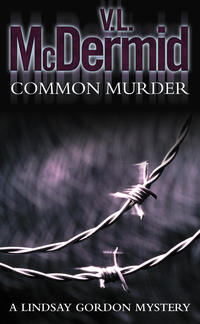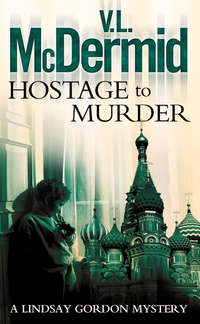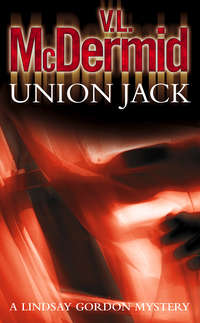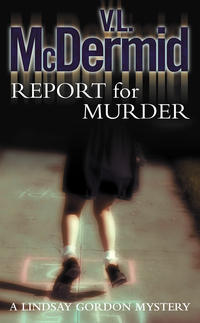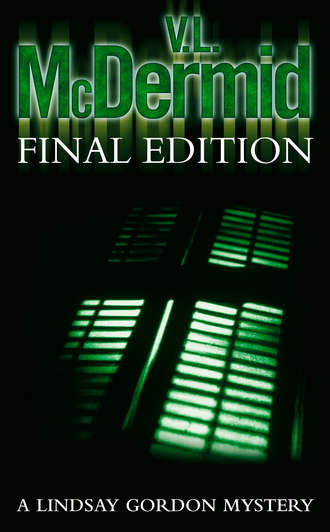
Полная версия
Final Edition
‘That’s right. She’s serving life for the murder of Alison Maxwell.’
Lindsay stared at Claire, unbelieving. ‘This has got to be some kind of sick joke,’ she muttered. Lindsay turned to Sophie. ‘Tell me she’s making this up.’
Sophie shook her head. ‘She’s telling you the truth. The trial was just before Christmas. I’m sorry, I didn’t think to tell you.’
‘Jesus,’ Lindsay sighed, dragging out the syllables. ‘Alison? What the hell happened?’
Claire took over in businesslike fashion, perhaps because she sensed that Cordelia was too shaken to deal with Lindsay. ‘Alison was found strangled in her flat. Jackie had been there with her shortly before she was killed, and in the absence of any other obvious candidate, the police chose her. Unfortunately, the jury agreed with them. Shortly after her arrest, Jackie asked me to see if I could find you. She knew you’d been involved with a couple of murder investigations before, and she was very impressed with your courage over the Brownlow Common spy scandal. And of course, because you’re gay, she thought you’d be more sympathetic. She believed that if anyone could prove her innocence, it was you. While I was searching for you, I met Cordelia. I’m sorry if our relationship outrages you, but you can hardly have expected Cordelia to take a vow of chastity till you deigned to show up.’
Lindsay stared miserably at Cordelia. It was all too much to take in. She had lost the one woman with whom she had ever formed an equal relationship; a former lover was dead; and a former colleague was in prison for her murder. Once she could have turned to Cordelia for the love and support to carry her through those moments when the roof caved in on her life. But it was too late for that now. She gradually became aware that Claire was talking to her. ‘I’m sorry,’ Lindsay said. ‘I didn’t catch what you said.’
‘I said I’d like to discuss with you the possibility of trying to clear Jackie’s name. It’s not too late for an appeal if we can dig up some fresh evidence. I’m not asking you to make any decision now – I realise this has been rather a traumatic evening. But I’d appreciate it if you’d call me tomorrow when you’ve had time to think it over.’ Claire fished in the inevitable filofax and produced a card. ‘My home and my business numbers are both there.’
Lindsay stared numbly at the card lying on the table. She couldn’t remember the last time she’d encountered someone with Claire’s thick-skinned audacity. Her nerve was breathtaking, a sharp contrast to the way Lindsay herself was feeling. She couldn’t believe this was happening to her. Coming home was supposed to feel good. But she couldn’t remember the last time she’d felt so bad.
3
Lindsay sat staring at the cigarette in her hand, watching the smoke spiral up to join the thick layer that hung below the ceiling in the crowded bar of the Tron Theatre. The noisy chatter of the literary wing of Glasgow’s renaissance could not distract her from the bleakness that filled her. She was shaken from her reverie by Sophie’s return from the bar with two spritzers, condensation already dripping down the glasses. ‘Drink up, doctor’s orders,’ Sophie said sympathetically as she sat down.
‘Thanks,’ Lindsay muttered. ‘Sorry to spoil your evening.’
‘Don’t be daft,’ Sophie replied. ‘I haven’t seen a cabaret as good as that since last year’s Edinburgh Festival. I’d forgotten what a drama queen you can be. I’ll be dining out on it for months.’ In spite of herself, Lindsay smiled. ‘So, what are you going to do about it?’ Sophie added.
‘About Cordelia or about Jackie?’
‘Both.’
Lindsay sighed. ‘There doesn’t seem to be a whole lot I can do about Cordelia, does there? She’s got herself a class act to cuddle up to. Much more her speed than a toerag like me, don’t you think?’
‘More fool Cordelia, then,’ said Sophie consolingly. Privately, she thought Lindsay’s reaction to Cordelia’s new relationship was completely unreasonable, but she was too fond of her to say so yet. There would be plenty of time to thrash it out when Lindsay was feeling less raw. She tried to take her mind off the débâcle in Soutar Johnnie’s, saying, ‘But what about Jackie?’
Lindsay shrugged. ‘I don’t know. The fact that I’ve managed to dig out the truth a couple of times in the past doesn’t mean I’m some kind of private eye. You know, Sophie, I can’t seem to take it in that Alison’s dead. I mean, when I was having my own little fling with her, God knows I felt like strangling her often enough; but the difference between feeling like that and actually doing it … I can’t imagine what makes that possible. I suppose I feel like I’ve got a score to settle on Alison’s account, never mind Jackie. But I’m in such a mess about myself and my future that I don’t know how much use I’d be.’
Sophie ran a hand through her curly hair, a gesture Lindsay recognised from the days when the brown hadn’t been streaked with grey. ‘I know what you mean,’ she said with feeling. ‘But you’re not committed to anything else right now, are you? And in spite of the way you’ve been putting yourself down ever since you saw Claire and Cordelia together, you’ve got a pretty good track record when it comes to discovering things that the police have missed or ignored. And there is one other aspect of it you might not have considered. If you can get Jackie released, it might well be enough to drive a wedge between Cordelia and Claire. That would at least give you the chance to find out if the two of you have still got a future together.’
Before Lindsay could reply, a booming Liverpool accent rang across the room. ‘Bloody skinflint, Hartley. Where’s the bottle? I suppose we’ll have to buy our own drinks?’
Lindsay swung round in her seat to see Helen Christie waving from the bar, her unmistakable mane of carrot-red hair glinting under the lights. Behind her, paying for a carafe of wine, was her fellow Sister of Treachery, Rosalind Campbell. As they came over to the table, Lindsay thought it was no wonder that they struck terror into their political opponents. They looked like a pair of Valkyries striding across the bar.
‘My God,’ Helen groaned as she subsided into a chair, after planting a cursory kiss on the top of Sophie’s head. ‘What a night we’ve had! That lot couldn’t organise an explosion in a fireworks factory!’
Lindsay watched fondly as Helen and Rosalind launched into a double-act recitation of the evening’s meeting. No matter how down Lindsay felt, Helen had always had the power to make her laugh. They’d met at Oxford, the only working-class students reading English at St Mary’s College. They’d instantly formed an alliance whose main weapon had been satire, a desperate wit born of their never-admitted feelings of inferiority. After university, their ways had parted, Lindsay choosing journalism, Helen arts administration. Now, she ran her own television and film casting agency, and, with what was left from her boundless supply of energy, she had thrown herself into local politics.
But the two women had stayed in touch, and even when Helen and Sophie had set up home together eight years earlier, there had been no diminution of the close friendship that still bound Lindsay and Helen. In fact, Lindsay had gained a friend in Sophie. When Helen and Sophie had split up eighteen months before, Lindsay had feared that she would be forced to choose between her two friends. But to her amazement, the ending of their love affair had been remarkably without rancour, and they had remained the closest of friends. The only real change, as far as Lindsay could see, was that they now lived separately. Neither had formed any lasting relationship with anyone else, although, according to Sophie, Helen had recently been spending time with a young actress she’d spotted in a pub theatre group and placed in a new television series.
Lindsay suddenly became aware that Helen was looking enquiringly at her. She pulled herself back into the painful present. ‘I’m sorry,’ she confessed, ‘I didn’t catch what you said.’
‘Pearls before swine,’ Helen sighed. ‘Here am I, bringing you despatches from the front line of British politics, and you’re daydreaming about some leggy blonde, no doubt. I said, what kind of evening have you had, Lindsay?’
‘Ask Sophie,’ Lindsay replied wryly. ‘She’s already told me it’s given her enough ammo to sing for her supper for months to come. You might as well practise on the experts, Soph.’
Sophie pulled a face, then launched into a detailed account of their earlier encounter at Soutar Johnnie’s. Before she could finish, Helen had exploded. ‘My God, what a complete shit for you, Lindsay!’ she exclaimed. ‘I had no idea she was still around, did you, Sophie? We saw her a couple of times after you first left, Lindsay. She was desperate to get in touch with you and thought you might have been in contact with one or other of us. But I thought she’d gone back to London. Poor you!’
With her usual detachment, Rosalind had been listening. As Helen paused for breath, she cut in. ‘You will take it on, though, won’t you? I can’t imagine you sitting back and letting Jackie rot.’
Reluctantly, Lindsay nodded. ‘I don’t suppose I’ve got much choice.’
‘Well at least Claire can afford it,’ Rosalind said.
‘Afford what?’ Helen demanded.
‘Afford Lindsay,’ Rosalind replied.
‘What do you mean, afford me?’ Lindsay asked, puzzled.
‘You’ve got to be realistic about it,’ Rosalind said patiently. ‘You’ve got no job and no prospect of one, if I understand you correctly. If you refuse to help and Claire wants to pursue this, she’s going to have to go to a private detective. There is no reason on God’s earth why you should be prepared to do it for free. And Claire Ogilvie can certainly afford to pay.’
Lindsay looked stunned. ‘I’m not taking money from that bloody designer dyke,’ she replied angrily. ‘What do you take me for?’
‘Ros is right,’ Sophie said quietly. ‘If Claire wants you to do a job, she should be prepared to pay the going rate.’
‘It feels like taking money under false pretences,’ said Lindsay stubbornly. ‘I’m hardly Philip Marlowe, am I?’
‘You’ve got skills and specialist knowledge,’ Rosalind argued. ‘It’s unprofessional not to charge her for exercising them. I can’t imagine Claire dishing out free professional advice, can you?’
‘But I don’t know where to start,’ Lindsay said weakly, knowing she had been outflanked by Rosalind. And, given the tenacity of her friends, she knew she’d actually have to go through with the business of charging Claire for her services.
‘I might just be able to help you there,’ Rosalind said with a slow smile.
Lindsay rang off and threw the cordless phone to the other end of the sofa. Burned my boats now, she thought with a scowl. ‘Why do I let myself get talked into these things?’ she muttered as she walked through to the big, airy kitchen of Sophie’s tenement flat. Lindsay poured herself a cup of coffee and sat down to think. She had agreed to meet Claire in an hour’s time, and she wanted to get everything straight in her head before then.
Recalling Alison Maxwell wasn’t difficult. They had met the first time Lindsay had been hired to do a shift on the Scottish Daily Clarion. Lindsay had been standing at the library counter waiting for a packet of cuttings. She turned to find herself faced with a woman who seemed to have stepped out of her most secret fantasies, the ones she guiltily felt shouldn’t inhabit the mind of a politically aware feminist. The vision had sandy blonde hair, and an almost Scandinavian cast to her high-cheekboned features. She was a couple of inches taller than Lindsay, with slim hips, and a cleavage that was impossible to ignore. ‘Hi,’ she said in a rich, cultivated Kelvinside accent. ‘I’m Alison Maxwell. Features department.’
Lindsay had fallen head over heels in lust. ‘Pleased to meet you,’ she croaked, feeling gauche and adolescent. ‘I’m Lindsay Gordon. I’m doing a shift for the newsdesk.’
‘Ah,’ said Alison. ‘Pity you’re not a photographer, then I could call you Flash Gordon.’
‘If I get the front page tonight, then you can call me Splash Gordon instead.’
Lindsay hadn’t made the front page splash that night, but she’d still been Splash from then on to Alison. To Lindsay’s surprise, the feature writer seemed determined to include Lindsay in her busy social life, inviting her out to dinner, to parties and to her flat for drinks. It wasn’t long before they became lovers. But it was Alison who made the first move. If it had been up to Lindsay, they would never have got beyond a peck on the cheek when they parted. Lindsay would have been happy to leave Alison on her pedestal, having no confidence at all in her own power to attract a woman so different from her previous lovers.
At first, Lindsay was in a daze of lust fulfilled by exotic and imaginative sex. But once the initial infatuation wore off, she began to see Alison more clearly, and she grew to dislike and distrust what she saw. Lindsay gradually came to understand that Alison Maxwell was a woman who was incapable of simple human relationships. She was too in love with power to have love left over for people. That power was usually exercised through the nuggets of information she’d acquired in the bedroom. It took only a matter of days for Lindsay to discover that she was far from being Alison’s only lover. In a matter of weeks, she had reached the bitter conclusion that Alison was sexually omnivorous.
Faced with this, Lindsay had made up her mind to end their relationship. That was when she had discovered the cruellest streak in Alison. For Alison was a woman who only let go when she was ready. She had to have control over every situation, and that included the ending of her sexual relationships. When Lindsay had announced her intention to sever their connection, Alison had wept and raged, and finally threatened. She would claim that Lindsay had got her drunk and seduced her. She would make sure everyone knew what a twisted little dyke Lindsay was. And she’d make sure that Lindsay never did another day’s work at the Clarion. Her venom had unnerved Lindsay, and she had allowed herself to be swallowed up in the passion of their reconciliation.
The following day, ashamed of having given in to Alison’s blackmail, Lindsay had left town for a few days, making the excuse of a feature she wanted to research in Aberdeen. By the time she had returned, Alison had been absorbed in someone new, and had lost all interest in Lindsay, much to her relief. Being dropped from Alison’s social circle had left a gap at first, but Lindsay was grateful to have survived relatively unscathed. As the months passed and she observed her former lover wreaking havoc in other people’s lives, Lindsay vowed never to let her fantasies run away with her again.
Since she’d moved away from Glasgow, Alison had been no more than a distant memory. But the news of her death had brought these memories to life. There had been so much life in Alison. It might not have been a desirable vivacity, but nevertheless, Lindsay felt herself diminished by Alison’s death. They had hit the heights together, after all. And she’d been a bloody good journalist. The same skills that she used to wind her lovers round her little finger were invaluable when it came to persuading interviewees to open up to her. Alison might have been a bitch, thought Lindsay sadly, but she didn’t deserve to die like that. And however hard she tried, Lindsay couldn’t picture Jackie Mitchell as her killer. Jackie had been a hard-nosed journalist, but underneath, like so many of them, she was soft-centred and weak. Nothing Lindsay had learned about the murder seemed to fit her image of Jackie.
Rosalind had provided a surprising amount of information about Alison Maxwell’s murder. Surprising, that is, until Lindsay had remembered that Rosalind’s compact modern flat was in the same block as the dead woman’s apartment. As a result, Rosalind had taken a keen interest in the progress of the investigation and trial. The training and experience she’d acquired over her years in the civil service had stood her in good stead when it came to reporting her version of events to Lindsay. She had run through everything she knew in a crisp, factual way, making Lindsay feel like a Scottish Office Minister on the receiving end of some vital briefing. No wonder politicians felt inferior to their senior civil servants! And no wonder Rosalind had climbed to the rank of Principal Officer.
All the evidence against Jackie had been circumstantial, Rosalind had reported. She had never denied that she had been in Alison’s flat on the afternoon of the murder. She had never denied that they had been to bed together. She had never denied her ownership of the scarf that had strangled Alison. But from the moment of her arrest till now, convicted and sentenced, she had vigorously denied killing her. The point at issue, according to Rosalind, was whether Jackie was telling the truth about the time of her departure.
‘Jackie was seen by Alison’s mother leaving the building by the side door at five minutes to six. Mrs Maxwell was trying to gain admittance to the block. We have security entryphones, and there was no response from Alison’s flat. Mrs Maxwell had to wait another fifteen minutes before someone arrived who could let her into the building. They went up in the lift together. Mrs Maxwell went straight to Alison’s flat, where the front door was ajar. She walked as far as the bedroom door, saw her daughter and started screaming,’ Rosalind explained.
‘Jackie maintained at the time, and later, that she had left the flat nearly half an hour before the body was discovered. She had walked down the fire escape stairs rather than take the lift, and stopped to have a cigarette and a think. The police took the not unreasonable view that this was scarcely normal behaviour. And of course, once they had Jackie in custody, and had satisfied the Procurator Fiscal that the case against her covered all the eventualities, the investigation stopped dead.’
It didn’t leave too many avenues for exploring, Lindsay thought to herself as she finished her coffee. But Rosalind had been able to give her a spare set of keys to the building and her flat. Later this afternoon, Lindsay would take advantage of that to have a good look around and refresh her memory about the layout of the block that had once been almost as familiar as her own tenement. But first, she had to face Claire.
She glanced in the full-length mirror in the hall as she reached for her heavy sheepskin jacket. If Cordelia was going to be at Claire’s, Lindsay wanted to look her best. All the exercise and healthy eating in Italy had left her nearly a stone lighter, and her tight Levis emphasised the fact. But her thick Aran sweater did her no favours. Impatiently, Lindsay pulled it off and surveyed herself in the loose but flattering scarlet polo shirt she was wearing underneath. She’d probably freeze to death, but at least she was looking pretty good. She shrugged into her jacket, determined to show Cordelia exactly what she was missing!
4
Lindsay managed to find a free parking meter by the river, a couple of streets away from Claire’s flat. She set the alarm on her ancient MGB roadster then strode briskly through the misty winter air, casting a jaundiced eye on the cold grey waters of the Clyde. Not an improvement on the blue of the Adriatic, she thought. At times like this, she wished she’d never left Italy. Fancy thinking coming home would solve anything.
Following Claire’s detailed instructions, she turned into a narrow alleyway which opened out into a small courtyard with several staircases leading off it. Originally, these had been the semi-slum homes of the ill-paid clerks who had tended the fortunes of the Victorian merchants and shipping magnates who had once made the city great. Over the years, the properties had deteriorated, till they were precariously balanced on the edge of demolition. But in the nick of time, a new prosperity had arrived in Glasgow and the property developers had snapped up the almost derelict slums and renovated them. Now, there were luxury flats with steel doors and closed circuit video security systems where once there had been open staircases that rang with the sounds of too many families crammed into too small a space. Lindsay surveyed the clean, sandblasted courtyard with an ironic smile, before pressing the buzzer for Claire’s flat and glowering at the camera lens three feet above her head.
The speaker at her ear crackled, and she could just make out Claire’s voice. ‘It’s Lindsay,’ she said, and was rewarded by the angry buzz of the door release. Lindsay mounted the stairs to the third landing, where Claire stood by her open front door. Lindsay took in the details of her appearance that she had been too upset to notice the night before. The most striking thing about her was her height. She was nearly six feet tall, and her body had all the willowy sinuousness of a model. Her fine white-blonde hair was beautifully cut, like the severely tailored grey herringbone woollen suit she wore. She looked like a recruitment poster for law graduates.
‘Come in,’ Claire greeted her. ‘You’re very punctual.’
Lindsay bit back a sarcastic retort and followed her through a spacious hallway furnished with a small Turkish carpet and several pale wood bookcases. In an alcove, behind glass doors, was a collection of Oriental porcelain. Claire showed her into a huge square room with two bay windows which overlooked the river. The room must originally have been the living rooms of two separate flats, Lindsay thought to herself. Two families would have occupied the space now filled with Claire’s Scandinavian pine furniture and colourful wall hangings. Even the stereo system and the CD collection were housed in tailor-made glass-fronted pine units. It could have come straight from the pages of the kind of glossy magazine Lindsay couldn’t imagine wanting to write for. Cordelia would feel right at home here, she thought bitterly, taking in the Cartier briefcase standing beside the sofa. The room’s designer consumerism epitomised everything that had disturbed Lindsay about their life together. But Cordelia had never shared her discomfort.
‘Can I get you a drink?’ Claire asked.
‘No thanks,’ Lindsay replied. She might have to take Claire’s money, but she was damned if she would accept anything that fell outside the ambit of a purely professional relationship. At least Cordelia wasn’t here to churn up her emotions again, she thought with a mixture of relief and regret. ‘So, you said that Jackie wants my help,’ she added, perching on the edge of a pine-framed armchair.
Claire pushed her glasses up her nose in a nervous gesture. ‘That’s right,’ she said. ‘Look, before we start, I just wanted to apologise for last night. I realise it must have been something of a shock for you, and I’m sorry if I was less than helpful.’
Lindsay shrugged. ‘What exactly did Jackie want me to do?’
Claire was clearly unsettled by Lindsay’s ungracious response to her apology, and walked over to the window to stare out at the mist-shrouded water. ‘She thought you could establish her innocence.’
‘But why? What made her think I could succeed where the police and her own lawyers had failed? Surely if there had been anything to go on you would have hired a private detective before the trial.’
Having recovered her poise, Claire turned back and sat down on the edge of the sofa. Lindsay couldn’t help picturing Cordelia curled up there beside her, watching television or just talking. She pushed the bitter thought aside and forced herself to listen to Claire. ‘We didn’t go to a conventional private detective because Jackie didn’t believe that we’d find one who would genuinely be on our side. I have to say that in my experience professionally with the breed, I wouldn’t expect to find one who was sympathetic to a gay woman. Jackie thought you’d believe her. And she thought you’d have a vested interest in finding out the truth. She knew about your own affair with Alison, knew you’d understand what she’d been put through.’
Lindsay lit a cigarette without her usual courtesy of asking permission first. Claire leapt to her feet, saying, ‘I’ll get you an ashtray.’ She disappeared through another door and returned moments later with an ostentatiously large crystal ashtray. Lindsay felt that using it would be like shouting in a museum. Claire placed it on the occasional table next to Lindsay’s chair and said, ‘Well, will you help? She didn’t do it, you know.’ There was a note of desperation in her voice that touched Lindsay in spite of herself.



